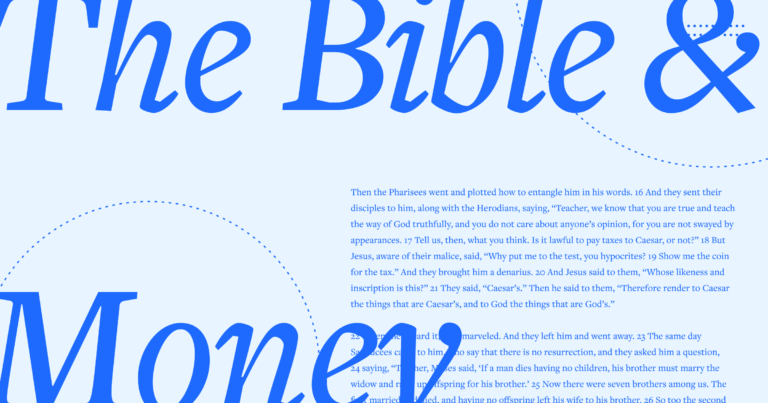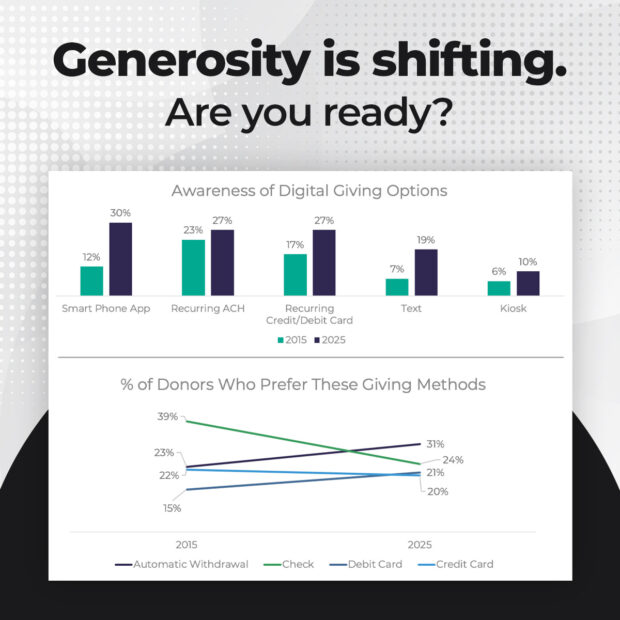
Why did David kill Goliath? Was it because of a selfless devotion to God and his people, or perhaps something else? First Samuel 17:25–26 gives the answer: David asked what would be done for the person who could kill Goliath, and the Israelites said: “The king will give great wealth to the man who kills him. He will also give him his daughter in marriage and will exempt his family from taxes in Israel.” Even the most beloved of our biblical stories often have money and possessions at their center.
Biblical scholar and theologian Walter Brueggemann makes a claim that would probably be surprising for many of us to hear: “[T]he Bible is indeed about money and possessions.”1 Many of us might balk at that: Isn’t the Bible about God and God’s redemption of his people? Yet in the pages of Scripture, we find more than two thousand references to money and possessions.
What exactly then does the Bible say about money?
Table of contents
Jesus on money
None of these references are more striking, however, than Christ’s words in the Sermon on the Mount:
No one can serve two masters; for either he will hate the one and love the other or else he will be loyal to the one and despise the other. You cannot serve God and mammon. (Matt 6:24)
Mammon, the Aramaic word for “wealth,” is not presented as a neutral entity. Rather, it is a rival god. As we consider what the Scriptures say about money and possessions, it is important that we remember this context—knowing that if we get it wrong, Jesus says our souls are in danger!
The billionaire is not the only person susceptible to greed. Even the poor are subject to this vice. Mammon does not discriminate.
But what do we place in this category of money and possessions? The category includes what we know as capital, that is, resources like land that we use to make profit, but it also includes everything that we claim to possess. That is, the billionaire is not the only person susceptible and perhaps enslaved to greed. Even the poor are subject to this vice. Mammon does not discriminate. So as we consider together what the Scriptures say about money and wealth, let us remember that we are all implicated.

The economics of the Bible
Framing the Bible’s discussion of money is a particular account of economics: how resources are distributed. This account is dictated by some basic theological claims.
1. Everything belongs to the Lord
In the kingdom of God, there is nothing over which we can properly proclaim, “This belongs to me and me alone.”
When the Lord says in Psalm 50:10, “Every animal of the forest is mine, and the cattle on a thousand hills,” God is making a statement about wealth. In an economy where wealth was measured by the size of one’s flock, God reminded those who read the Psalms that everything belongs to him.
Thus anything and everything that we think we possess is not actually our possession, but rather is a gift from the Lord.
2. We are called to share
Insofar as one possesses wealth and possessions, the primary call on the Christian is to share. When God shaped his people into a people, both immediately following the Exodus and after Pentecost, one of his priorities was a particular economy.
In Deuteronomy 15, the Israelites are told to constantly cancel debts so that there would be no poor or needy people in their midst. That is, there would be no underclass kept in that position by exploitation. Paired with that system was an ethical mandate that, if any among them would become poor, the people of God would not “be hardhearted or tightfisted toward [their fellow Israelites]. Rather be openhanded and freely lend them whatever they need” (Deut 15:7–8). The people of God were called to be a sharing people who refused to enslave one another.
That vision was then fulfilled in Acts 2 after the Spirit of God descended on the people. They were then marked by particular actions: “All the believers were together and had everything in common. They sold property and possessions to give to anyone who had need” (Acts 2:44–45). To make the point even stronger, when the same practice is described two chapters later, we are told that “God’s grace was so powerfully at work in them all that there were no needy persons among them” (Acts 4:33–34). There were no needy because the people of God treated money and resources in the way that the resurrection required: They shared.
3. Wealth easily leads to idolatry and injustice
Finally, wealth very easily leads to the creation of social injustice and exploitation, as well as idolatry—a point the Scriptures repeat over and over.
In this way, the Scriptures frame two huge risks that come along with money and possessions: risks to yourself and risks to your community. The prophets regularly inveigh against the rich who exploit the poor (e.g., Amos 6:4–7; Isa 2:6–7; 3:14–15; Mic 3:9–11). Even in considering why the people of Israel went into exile, the prophets give two answers: idolatry and exploitation of the poor. To exploit the vulnerable was to place the community in danger. Wealth, particularly beyond one’s needs, is a supremely risky thing.
But the Scriptures are just as relentlessly after us personally. The New Testament has very few positive words to the rich (besides Paul’s words to Timothy about them, which amounts to a calling to share; see 1 Tim 6:17–19). Accumulating capital for yourself in the presence of and without care for the needy in one’s midst places you in the category of the rich fool of Luke 12:16–21. This parable is immediately preceded by these words of Jesus, “Watch out! Be on your guard against all kinds of greed; life does not consist in an abundance of possessions” (Luke 12:15). The rich fool, in focusing on himself, falls into the same trap as the rich young ruler (Mark 10:17–31; Matt 19:16–30; Luke 18:18–30). For both of these men, money lived as a god and master in their lives, dictating their actions and priorities.
This is the great risk: that we would be found on the wrong side of the cosmic war between God and Mammon.
Is it wrong to want to be rich? Find out in Malcolm Foley’s What in the Word? interview.
The difference between wealth and materialism
So then it might seem that the Scriptures as a whole are anti-wealth. That, however, is not entirely accurate.
The Scriptures are anti-greed and anti-covetousness, which means they are against our desires stretching beyond our needs. It is both wanting too much and holding too much. As Paul says in 1 Timothy 6:9, “Those who want to get rich fall into temptation and a trap and into many foolish and harmful desires that plunge people into ruin and destruction.” Even the desire to get rich is sinful according to the Scriptures, because it is a desire that indicates a misplaced faith.
But in that same letter, Paul has a word to the rich as well (1 Tim 6:17–19), meaning that we cannot take the Scriptures to mean that being rich at any given time is evil. The apostle’s word to the rich here—that they are not to be arrogant and not to place their hope in wealth, but rather that they ought to do good and share—indicates that the issue is not how much you have, but rather how much you hold.
Thus, the Son of God teaches us to pray for our daily bread in the Lord’s Prayer (Matt 6:11; Luke 11:3), and Agur prays,
Give me neither poverty nor riches, but give me only my daily bread. Otherwise, I may have too much and disown you and say, “Who is the Lord?” or I may become poor and steal, and so dishonor the name of my God. (Prov 30:8–9)
Materialism is the excessive seeking after and placing of faith in material possessions for “our hope and happiness, significance and security.”2 It manifests itself in selfishness and hoarding, which Christ warns against: “Do not store up for yourselves treasures on earth, where moths and vermin destroy, and where thieves break in and steal” (Matt 6:19–20).
The remedy, however, is “storing up treasures in heaven,” a somewhat obscure phrase that Jesus does not explain in Matthew. But he does in Luke:
Sell your possessions and give to the poor. Provide purses for yourselves that will not wear out, a treasure in heaven that will never fail, where no thief comes near and no moth destroys. (Luke 12:33)
So too, what Christ commands the rich young ruler is that he divest himself of all of his wealth (Luke 18:22). But what he demands of the crowd is that they make the regular habit of selling their possessions and giving to the poor. Such action is the most effective way to resist materialism, greed, and covetousness. If one wonders where the safest barns for their goods are, John Chrysostom preached, “the safe barns are not walls but the stomachs of the poor.”3
What does the Bible say about money? Start a free trial and discover for yourself with Logos’s Smart Search in Bible.
What about our fears and worries?
Hearing the Bible’s account of money and possessions often strikes the Christian with fear. In fact, Jesus’s framing of the issue in the Sermon on the Mount assumes that this would be the case. Immediately after saying we cannot serve both God and Mammon, Christ says, “Therefore I tell you, do not worry about your life, what you will eat or drink; or about your body, what you will wear” (Matt 6:25; emphasis added). Anxiety and money are close companions. According to Christ, we often worry because we are worshipping Mammon rather than God.
According to Christ, we often worry because we are worshipping Mammon rather than God.
Jesus offers a powerful theological reminder in Matthew 6:26–32: The God of the universe cares for you. The remedy to our fear and anxiety, as produced by greed, is to rely on God’s Fatherly care.
That theological affirmation then leads to a particular action: “Seek first his kingdom and his righteousness, and all these things will be given to you as well” (Matt 6:33). “These things” in that text are not riches, but needs. The Scriptures as a whole are a call to trust not in wealth, but in the Lord, the giver of all good gifts. That trust manifests itself in particular obedient action: the seeking of the kingdom and of the righteousness of God.
The author of Hebrews reasons in the same way, commanding us to be free of the love of money precisely because God has promised to be by our side (Heb 13:5). The answer to greed is a life that actually depends on the Lord on a daily basis.
The incarnation of the generous God
Eclipsing the temptation to greed, however, is an overwhelming image of our Savior. Despite possessing all things, Jesus chose not to hoard but to share with those of us united to him by faith and the Holy Spirit.
When exhorting the Church of Corinth to contribute to the needs of others, Paul makes this theological claim: “For you know the grace of our Lord Jesus Christ, that though he was rich, yet for your sake he became poor, so that you through his poverty might become rich” (2 Cor 8:9). Paul picture’s the incarnation as divine self-emptying for the purpose of human uplifting.
This divine act, according to Paul, sets the paradigm for how we ought to think about our own money, possessions, and gifts: They are not meant to be hoarded, but shared in order to uplift our neighbors. If we serve a sharing God, we ought to be a sharing people.
Conclusion
The Scriptures remind us over and over of the temptation that comes with riches. They can be used for good or evil, for our neighbors’ uplift or to support their exploitation. Even in our own emotional lives, money can be the source of undue joy or of fear and anxiety.
The Scriptures as a whole are largely ambivalent about money and often pessimistic about its effect on our lives. That pessimism comes from the fact that we are often eager to run into Mammon’s arms for security.
Yet while Mammon encourages us to trust it, Jesus reminds us to trust him. After all, Mammon did not take on flesh and die for us. The eternal Son of God did that.
Resources on the Bible and money
The Anti-Greed Gospel: Why the Love of Money Is the Root of Racism and How the Church Can Create a New Way Forward
Save $9.90 (45%)
Price: $12.09
-->Regular price: $12.09
On Wealth and Poverty, 2nd ed. (Popular Patristics)
Save $4.01 (21%)
Price: $14.99
-->Regular price: $14.99
Money and Possessions (Interpretation: Resources for the Use of Scripture in the Church)
Save $12.00 (30%)
Price: $27.99
-->Regular price: $39.99
Wealth and Poverty in Early Christianity
Save $4.00 (19%)
Price: $16.99
-->Regular price: $16.99
Neither Poverty nor Riches: A Biblical Theology of Possessions (New Studies in Biblical Theology, vol. 7 | NSBT)
Save $10.00 (33%)
Price: $19.99
-->Regular price: $19.99
Jesus and Money: A Guide for Times of Financial Crisis
Save $9.00 (45%)
Price: $11.00
-->Regular price: $11.00
Redeeming Money: How God Reveals and Reorients Our Hearts
Save $7.20 (40%)
Price: $10.79
-->Regular price: $10.79
Related content
- Is It Wrong to Want to Be Rich? | Malcolm Foley on 1 Timothy 6:6–10
- Beyond Money: What the Parable of the Talents Really Teaches
- Is Money the Root of All Evil? What the Bible (Really) Says
- Theology of Work: How and Why Our Work Matters to God


 3 weeks ago
22
3 weeks ago
22








 English (US) ·
English (US) ·